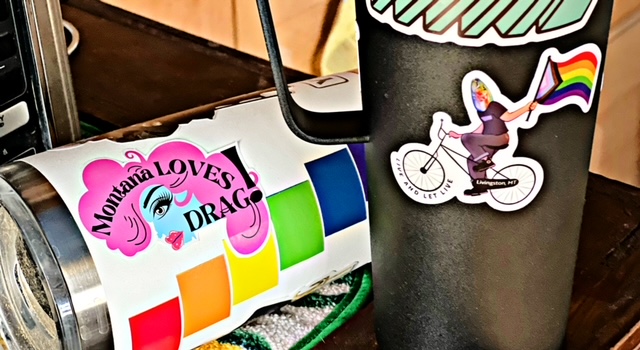Congress shall make no law respecting an establishment of religion, or prohibiting the free exercise thereof; or abridging the freedom of speech, or of the press; or the right of the people peaceably to assemble, and to petition the Government for a redress of grievances.
On Monday, it seemed like Spring had finally arrived in Southwest Montana. The temperatures were in the ‘60s—jacket weather—and the clouds overhead threatened rain. But only a light mist hit the windshield of the Pony, my daughter’s Chevy Avalanche that she steered toward Helena. With Courtney at the wheel, I got lost in some memories that were at least fifty years old.
The 1968 Democratic National Convention in Chicago came to mind. Demonstrating for peace, the crowd of thousands of activists became unruly, ultimately growing violent. It was my first protest march. There were several demonstrations in Cleveland for the same cause. Maced and clubbed by cops, we dispersed as it was the authorities who incited violence. There was Washington, D.C., where hundreds of us rounded up by Capitol Police were placed in an open-air enclosure before being released after three or four hours had passed.
My college had gone on strike and small groups of us traveled to Kent State and the University of Michigan to express our thoughts about Vietnam. “Hey, hey LBJ…” rolled off our lips without regard for President Johnson’s progressive social agenda.
Courtney and I were going to Helena to participate in a rally for Zooey Zephyr, who represents Missoula in the 100th district in the Montana House of Representatives. She is a transgender legislator who was being silenced by the Republican super-majority House. She had said to her colleagues that she hoped they would recognize the blood on their hands as their own if a piece of legislation that would bar gender-affirming care for minors were to pass.
It passed and Zephyr, cited for her lack of “decorum,” was censured and removed from the floor of the House for the remainder of the legislative session. She now sits on a public bench in the hallway of the state capitol from which she can vote on legislation she’s likely to not have had a voice.
This is the work of the so-called “freedom” caucus, a group of Republicans so fearful of the truth that they want to put limits on freedoms to protect freedom. It’s easy to note that they are more than merely confused.
As we walked up the sloped sidewalk to the first set of stairs leading to the capitol, I had some hesitations about being there. I have a live-and-let-live attitude toward pretty much everyone. My experience in the LGBTQ+ communities is nil. I have several gay and lesbian friends and I am about as disinterested in their private lives as I am in those of my straight friends.
But the LGBTQ+ community deserves to be respected and represented in every aspect of the American experience.
Presumably, that is why Courtney and I ventured to Helena.
Standing around the capitol steps, the crowd grew. I spoke with several people. Those of my age half-heartedly reminding each other that here it is 50 years later and we’re still carrying the same placards, still fighting racism, still supporting voters’ rights. We are, by definition, secular humanists who believe in a separation of church and state. We support human rights, public education, and freedom from tyranny. We believe in choice. We crave arguments and civil discourse.
We don’t ban books; we read them.
After standing around for a while, reading the placards and chatting with others, it occurred to me that this rally wasn’t really about the LGBTQ+ community and the disrespect afforded it by the Republican-lead Legislature. This rally was about First Amendment rights. It was about free speech. It was about watching the majority rule based on so-called Christian values. While we were allowed to assemble peaceably on the Capitol steps, I imagined flak-jacketed, armed opponents trying to stop or disrupt the assembly.
That didn’t happen. There was no further sense of danger.
After brief speeches by three or four of her supporters, Zephyr took to the lectern as the crowd of maybe 200 people chanted “Let Her Speak.” It was invigorating and soulful—an enthusiastic call to action.
And I’ll be forever grateful that I got to go to a political rally with my daughter. I believe her mother and I raised her to be proactive in her duty as an American citizen to always do the right thing. We were right.
Photo illustration by Courtney A. Liska
Picadillo
I once had a Cuban friend whose family escaped to Florida in the late ‘60s. His mother invited us to her home for a dinner of picadillo—Cuban comfort food. Sweet and savory, it is simple to make and will become a regular in your menu rotation.
1 tablespoon olive oil
1 ½ pounds lean ground beef
1 medium onion, finely chopped
1 small red bell pepper, finely diced
4 cloves garlic, minced
Salt and freshly ground black pepper, to taste
⅓ cup dry white wine
2 tsp. dried oregano
½ tsp. paprika
½ tsp. cumin
1 (14oz) can crushed tomatoes
1 Tbs. tomato paste
¼ cup Worcestershire sauce
⅓ cup dried raisins
½ cup green pitted olives
⅓ cup chopped parsley
Heat a bit of olive oil and brown the ground beef, breaking it apart with a wooden spoon. If the beef ends up releasing a lot of grease, drain before proceeding.
Season with salt and pepper.
Add the chopped onion and bell pepper and cook until softened.
Stir in the garlic and cook until fragrant.
Deglaze the pan with white wine.
Stir in the tomato sauce, tomato paste, spices, oregano, Worcestershire sauce, salt and pepper. Cover and simmer for 15 minutes.
Add the olives and raisins. Continue simmering – this time uncovered – for another 15 minutes for the sauce to thicken and cling to the beef.
Stir in the chopped parsley and serve with rice.

Bravo.